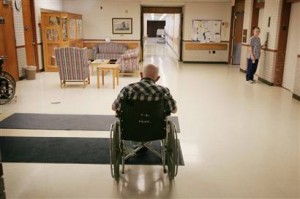Source: NY Daily News; Eli Lilly & Co.
 According to Audits conducted on Nursing Home Facilities in the United States, elderly patients with dementia are too often prescribed anti-psychotic drugs to calm disruptive behavior. The Senate Committe on Aging is apparently having hearings on this issue. Health and Human Services Inspector General, Daniel Levinson has stated that recent government audits raise concerns about the use of antipsychotics by elderly people with dementia in nursing homes, raising their risk of death and wasting money for the US healthcare system.
According to Audits conducted on Nursing Home Facilities in the United States, elderly patients with dementia are too often prescribed anti-psychotic drugs to calm disruptive behavior. The Senate Committe on Aging is apparently having hearings on this issue. Health and Human Services Inspector General, Daniel Levinson has stated that recent government audits raise concerns about the use of antipsychotics by elderly people with dementia in nursing homes, raising their risk of death and wasting money for the US healthcare system.
More than half of such prescriptions were wrongly paid for in 2007 by government Medicare because the patients did not exhibit symptoms of schizophrenia or bipolar disorder, amounting to about 230 million dollars in waste. One audit showed 14 percent of nursing home residents had Medicare claims for antipsychotic drugs, Levinson said.
Toby Edelman, Senior policy attorney in the office of the Center for Medicare Advocacy, Tobt Edelman, said that the estimate was low because it only included some kinds of anti-psychotics. “Nursing facilities’ self-reported data indicate that in the third quarter of 2010, 26.2 percent of residents had received antipsychotic drugs in the previous seven days. That is approximately 350,000 individuals,” she said. “Facilities reported they gave antipsychotic drugs to many residents who did not have a psychosis, including 40 percent of patients at high risk because of behavior issues.”
Sadly, this issue is not new -the same Senate committee issued a report on the misuse of drugs in nursing homes back in 1975. Although it is against federal law the practice of medication control continues, because of serious understaffing in nursing facilities, high turnover of staff, and “aggressive off-label marketing of anti-psychotic drugs.” In particular, in 2009, Eli Lilly Company accepted a Misdemeanor Charge related to Zyprexa(R) (olanzapine).Promotion Between 1999 and 2001. Lilly promoted Zyprexa in elderly populations as treatment for dementia, including Alzheimer’s dementia, although Zyprexa is not approved for such uses. As part of this agreement regarding the criminal investigation, Lilly agreed to pay $615 million. Under terms for the resolution of the civil investigations, Lilly agreed to make payments totaling nearly $800 million.
Posted by: Gayle R. Lewis, Esquire
